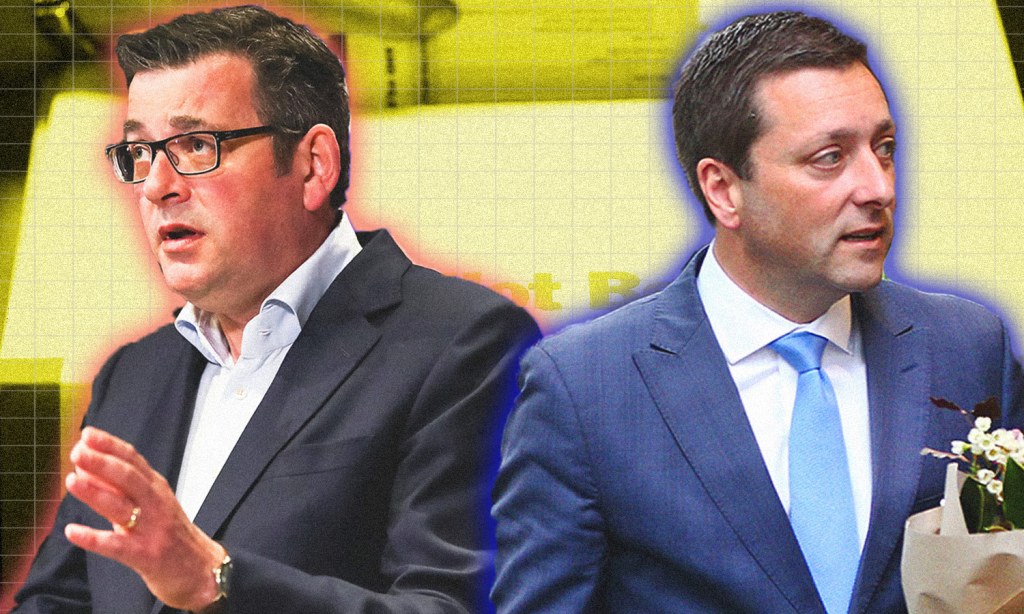The Victorian State election is about to get underway and the latest polling suggests that incumbent Premier Dan Andrews is neck-and-neck with the opposition leader Matthew Guy.
The men clashed in a rather lukewarm debate Tuesday night, in which neither scored any winning blows against their opponent. Andrews, however, managed to edge out Guy by winning the audience’s preferred candidate by a margin of just 2%.
The campaign itself has been anything but lukewarm, though. Already we’ve seen accusations of candidates having ties to far-right, neo-Nazi organisations, violence at early voting centres, and two anti-corruption referrals as allegations of vote rigging and fraud have been made.
Victoria’s Electoral Commission has also limited the number of campaigners allowed at a pre-polling station in north-west Melbourne over concerns about voter intimidation.
Andrews, the nation’s longest-serving current premier, is trying to win a third term at the highest office in Victoria while Guy, who came up against Andrews in the 2018 election, is back for revenge. This time, however, the battle is even more of an uphill climb for Guy, whose Coalition party need to gain 18 seats in the Legislative Assembly.
This being said, it’s still anyone’s game at this point in the proceedings. Here’s what you need to know.
What Are the Big Issues At Stake in the Election?
As with the Federal Election in May of this year, climate change and renewable energy are playing big factors. Voters also appear to be turning off mainstream parties and towards smaller teal independents and minor parties.
Of course, cost of living and healthcare are playing big factors here too. The Coalition are pledging to cap public transport fares in Melbourne to $2 per day, cut prices in half for regional lines, and give healthcare workers free public transport. They’ve also said they want to cut electricity supply charges for six months, saving households an estimated $235, while offering $500 to people waiting for state dental care.
Interestingly, the Coalition appears to have switched tack from the ‘law and order’ rhetoric that cost them the 2018 election. Instead, they’ve gone hard on education, healthcare, and public transport. These are familiar Labor areas and the party has also been campaigning hard on them.
Labor has said that they will bring back the State Electricity Commission — privatised in the 1990s — which will become a state-owned renewable energy company that they hope will bring down bills in the long run. They’re also offering a $250 payment to anyone who switches up their electricity provider. $12 million has been promised to overhaul the Victorian healthcare system, with hospital upgrades and a new facility set to be undertaken.
COVID, and the healthcare measures put in place by Andrews during the pandemic have, of course, played a big role in the election. Polarisation of the political space has been evident, with campaigns to ‘sack Dan Andrews’ being organised that instruct voters how to preference candidates that will see his removal.
In the minor party space, the Greens are hoping to hold their three seats and take Richmond, which is held by Labor by a decent margin of 5.8%. The teal independents are shaping up to take at least three seats in greater Melbourne which are considered ‘safe’ Liberal ones. Both groups are campaigning on integrity in politics as well as climate issues.
Who Will Win the Victorian State Election?
Although polling has narrowed in the final days, it’s widely expected that Labor will reclaim power, making Dan Andrews the longest-serving Victorian Labor premier.
A third straight loss for the Coalition will see them having to seriously reassess their offerings and re-think their attack strategies.
Labor hit a high in their polling in August, with Roy Morgan polling clocking the ALP with 60.5% of the primary vote. The same organisation found they held that figure by mid-October, but have since dropped to 55%.
Resolve Strategic has slightly lower expectations, with their latest polling showing the ALP will get 52.7% of the primary vote. At the last election, Labor secured 57% of the primary vote, so this would be a drop off but will still see them hang on.
If you’re a betting person, the TAB currently has Labor at odds of 1.12 to win, while the Coalition sits at 6.00.
Related: Dan Andrews’ Opponent Has Some Contradictory Polling
Related: Are State Elections Compulsory? All of Your Voting Questions, Answered
Read more stories from The Latch and subscribe to our email newsletter.







